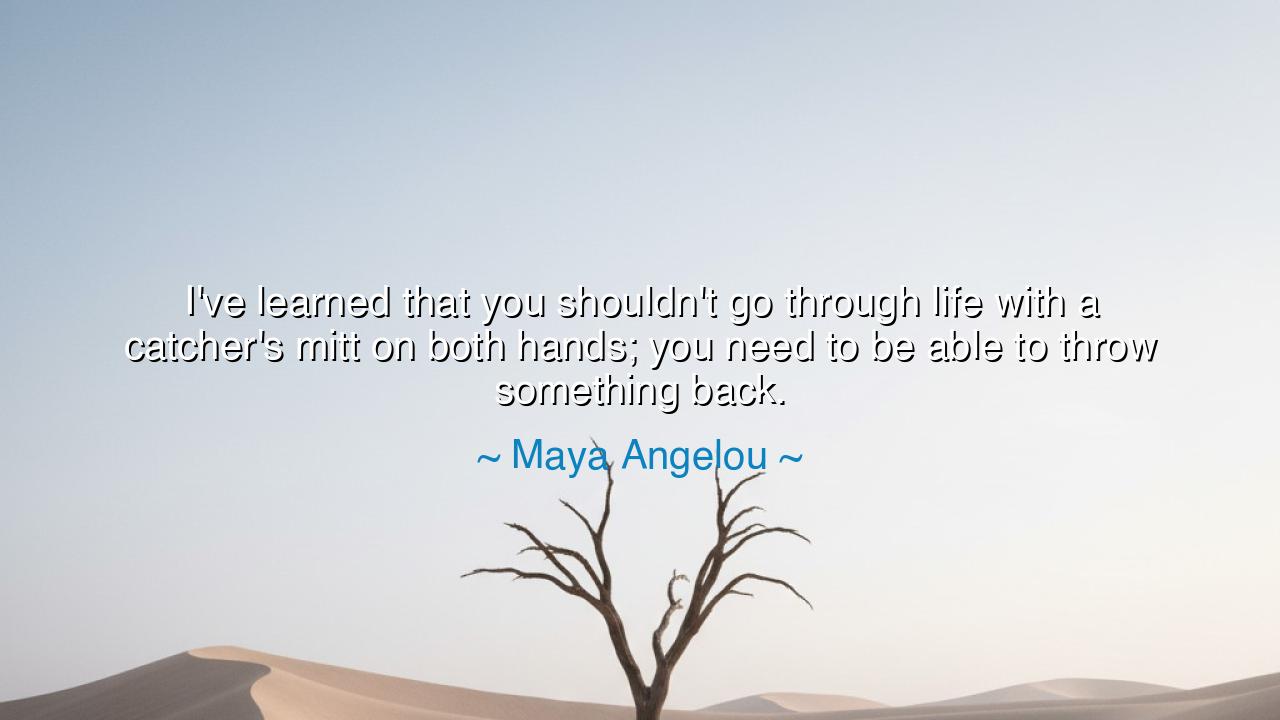
I've learned that you shouldn't go through life with a catcher's
I've learned that you shouldn't go through life with a catcher's mitt on both hands; you need to be able to throw something back.






The wise and luminous Maya Angelou, whose voice rose from suffering into song, once said: “I’ve learned that you shouldn’t go through life with a catcher’s mitt on both hands; you need to be able to throw something back.” In these words lies a truth as eternal as the turning of the seasons: that life is not meant to be a one-way act of receiving, but a living exchange of giving and receiving, of gratitude and generosity, of taking in and giving back. To walk through this world clutching only what is given to us is to live half a life, a life unshared and unfulfilled. But to receive with one hand and return with the other—this is the rhythm of the human spirit.
To hold a catcher’s mitt on both hands is to live guarded, ever ready to take, but never to give. It is the stance of fear and self-preservation, the posture of those who believe life’s blessings are scarce and must be hoarded. Such a person becomes a vessel that fills but never flows, and thus stagnates. Maya Angelou warns against this smallness of spirit, for she knew from her own life that the heart grows not by holding, but by sharing. The abundance of life multiplies only when it is given away—love given becomes greater, wisdom shared deepens, kindness extended returns like a circle completed.
Born into hardship and silence, Maya Angelou herself learned to transform pain into purpose. Her youth was marked by struggle and loss, yet she did not remain a receiver of sorrow; she became a giver of strength. Through her poetry, her teaching, and her compassion, she threw something back into the world—something luminous. Every poem, every word of encouragement, every act of grace was her way of returning what she had been given: the resilience of her ancestors, the lessons of her trials, the light of her healing. From this well of experience, her quote was born—not as mere advice, but as a creed: that those who have received from life, whether joy or pain, must give back in kind.
This lesson has echoed through history. Consider Helen Keller, who was struck blind and deaf at a young age, locked away from the world by her own body’s silence. Yet through the patient teaching of Anne Sullivan, she received the gift of language, the miracle of communication. And what did she do with this gift? She threw it back into the world a thousandfold—becoming a writer, a teacher, and an advocate for those imprisoned by disability. She could have kept her gratitude to herself, living quietly in her newfound understanding. But instead, she opened her hands and gave. Her life became a living echo of Angelou’s truth: that we must not only receive the world’s gifts but return them, reshaped by love.
Even the ancients taught this same law of life. The Greeks called it charis—the divine exchange of grace. To receive without giving was to break the harmony of the cosmos, to disrupt the sacred balance. The farmer who took from the earth without giving back left the soil barren. The student who learned from the master but shared his knowledge with no one betrayed the very purpose of learning. So too in our lives: to take love, help, or wisdom and hoard it for ourselves is to dishonor the source of those blessings. Giving back is not a duty—it is the natural completion of receiving.
Maya Angelou’s words also speak to the courage of participation. To “throw something back” is not only to give, but to engage, to step into the dance of life. Many move through the world timidly, afraid to give of themselves—to offer ideas, to show compassion, to stand up for truth. But life asks more of us than silent gratitude. It asks us to act, to speak, to love out loud. The one who dares to throw something back—to share their voice, their time, their spirit—becomes a co-creator in the great unfolding of existence.
So let this be your lesson, seeker of meaning: do not live with closed hands. Accept life’s gifts, but pass them onward. If you have learned wisdom, teach. If you have known love, give it freely. If you have endured pain, transform it into healing for others. Do not hoard your blessings or your lessons, for they were never meant to be locked away—they were meant to be shared, multiplied, and reborn through the lives of others.
And when your journey nears its end, may you look back not as one who only caught what life threw at you, but as one who cast it forward with purpose and grace. For in the giving, as Maya Angelou taught, we fulfill the cycle of creation itself—and in throwing something back, we become part of the eternal conversation between the soul and the world.






AAdministratorAdministrator
Welcome, honored guests. Please leave a comment, we will respond soon